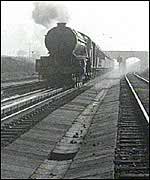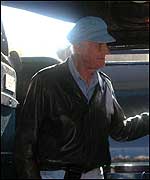|
A Nation on Film Special
After
World War Two, the Government paid film-makers to produce work that would persuade
people to use public transport. Some critics called
their productions expensive propaganda, but the British Transport Films unit (BTF)
produced some of our finest post-war documentaries.
The filmmakers were
young, talented and ambitious - they were striving for success in the film industry.
Their films weren't just about public transport - they captured a picture of post-war
Britain when the age of steam was still near its height. Picture
of Britain
The head of the unit was Edgar Anstey, a leading figure
in the British documentary movement.
 |
| The films captured the joys of rail travel |
Anstey and his team were creative with their brief -
making high-quality documentaries, commercials, travelogues and natural history
films. Many of the films were shown as 'shorts' in
the cinema. The films captured images of life in
post-war Britain - sometimes transport was given only a brief mention. They
often highlighted beautiful locations, and since most people didn't have cars,
the only way you could get there was by using public transport. Eventually
the unit won an Oscar for a natural history film, and several members of the team
progressed to great success in the feature film industry. They
included including Billy Williams, a camera assistant, who went on to become an
Oscar-winning cinematographer. Celebrating modern
railways
In many respects the films were about PR and spin, rather
than being pure documentaries. In the BTF's vision
of Britain there was little room, for example, for stories about over-crowded
trains and dirty old towns.
 |
| On the footplate - Billy Williams | They
would go to great lengths to make locations look as attractive as possible - which
often involved waiting for the sun to shine. When
it came to a story about the end of the tram there was trouble in the unit.
Some
thought it was an important historical moment to capture on film, but Anstey was
not happy as it didn't fit with his vision of celebrating a 'modern' public transport
system.
Also, when it came to the Beeching cuts, the unit followed their
paymasters and produced a film entitled 'Reshaping British Railways'. Classic
journeys
Nation on Film talks to some of the filmmakers who worked
for the unit and tells their story - from the unit's creation to their Oscar-winning
success.
Following Nation on Film viewers have a chance to watch one of
the unit's classics in its original form. 'Elizabethan
Express' follows the summertime express from Kings Cross, London, to Waverley
Station, Edinburgh.
The film, made in 1954, celebrates the glamour of
steam, and became popular because of its stunning images and use of rhyming commentary.
| 
